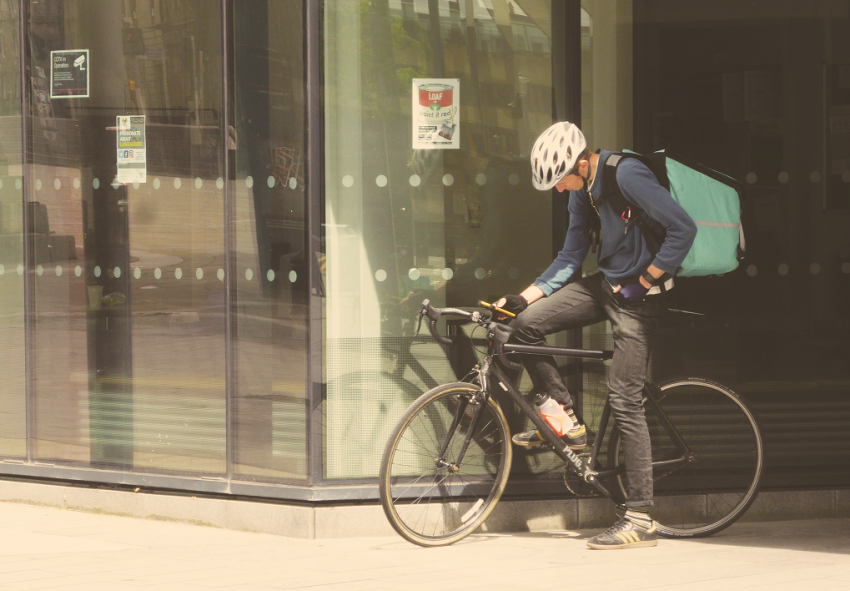
A federal Select Committee on Job Security looking into how rife insecure work is across the country is currently taking submissions from insecure workers in New South Wales.
Chaired by Labor Senator Tony Sheldon, it was set up last year after five food delivery drivers were killed at work. It is expected to report by November.
The committee has already received 77 submissions from diverse groups including the Transport Workers Union (TWU), Trades Hall Councils, lawyers’ advocacy groups, nursing and hospitality unions, the Australian Medical Association, university casual academics networks, aged and disability care providers and the National Association for the Visual Arts. The diversity of submissions reveals how widespread casual, fixed-term and precarious work is.
The big gig corporations — Menulog, Uber, UberEats, Ola and Deliveroo — have also made submissions.
In its submission, the TWU said government needs to regulate the gig economy. TWU national secretary Michael Kaine said on April 12 that workers in the industry face economic hardship at the “whim of an app notification”.
“Each day workers are stripped of their livelihoods at the whim of an app notification, with no redress. Those who are not are subjected to dangerous toil with the despair of vainly trying to subsist on less than half the national minimum wage. And that is, of course, only if that subsistence is not ended abruptly by death or serious injury wrought by these dangerous work pressures.”
Kaine said that if the federal government regulates the industry “all gig workers could have basic working rights”. Menulog, Deliveroo and Uber’s business model actively promotes a withering away of workers’ rights and wages.
The Senate committee learned that Uber pays its workers just $21 an hour. This is lower than the minimum wage, which is currently $24.80. Uber’s response was typically evasive. It claimed the “figure includes time between trips, meaning average earnings are actually higher”.
Uber, Menulog and Deliveroo rejected the idea that the workers are super exploited, claiming that workers like the “flexibility” they offer.
Menulog CEO Morten Belling claimed that “modern awards … are not suitable for the industry we’re working in”.
Deliveroo and Uber Eats rejected calls for their drivers to be classified as “employees”, claiming that minimum conditions and pay rates for riders would undercut flexibility by forcing fixed shifts. This is despite the fact that in Britain, Uber announced it will classify tens of thousands of its drivers as “workers”. This followed a British court ruling in February 19 that Uber drivers there are workers, not contractors.
Deliveroo argued that it would have to cut back its workforce in Australia if it was forced to do the same. Further, it claimed that scrutiny of its work conditions is unfair given that it had, supposedly, propped up the hospitality industry during the COVID-19 pandemic.
Deliveroo and Uber Eats said they would support “sick leave” and “personal leave” as long as the workers remain classified as independent contractors.
Menulog was the only corporation to concede that it “needed to do more” for its couriers. Belling told the Senate committee that it would start a pilot employment program for couriers around Sydney’s CBD. At the same time, Menulog will trial minimum wages and benefits for its couriers.
Unions and the corporate media have reported this trial as a significant win. However, there are caveats. Menulog’s trial for its Sydney CBD couriers is not the same as a commitment to a long-term employment plan. Menulog intends to establish a new award with the input of the Fair Work Commission and the TWU, but Belling said this would depend on the success of the trial.
He said he “hoped” that “in a few year’s time” all Menulog workers will be employed. However, this would mean that couriers have to work exclusively for Menulog, and have fixed shifts at lengths determined by industry awards.
In its submission, the New South Wales Society of Labor Lawyers said amendments to the Fair Work Act 2009 or special gig worker laws are needed to give workers the “minimum entitlements commensurate to other workers in the Australian economy”.
Meanwhile, the TWU and riders have formally withdrawn from the NSW Food Delivery Rider Taskforce (set up after the deaths of riders last year) over “its sustained refusal to discuss regulation or tackle the root causes of high rider deaths and injuries, such as economic pressures that force riders to work dangerously and fatigued”.
The TWU concluded that the taskforce was a politically-motivated diversion from the obvious need for regulation of this super-exploitative industry.